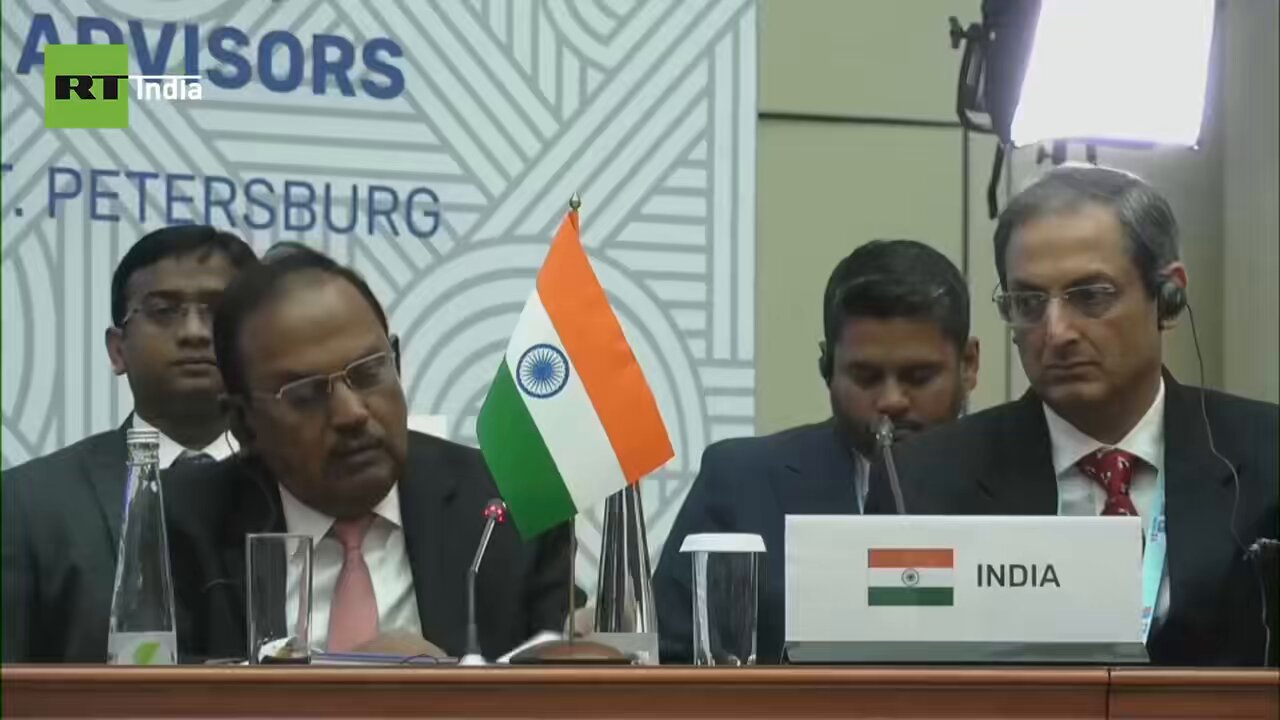India’s national security advisor is in Russia for a meeting of the grouping’s security officials
Existing global institutions are unable to deal with the world's conflicts and there is an “urgent need” to reform multilateralism in global affairs, Indian National Security Adviser Ajit Doval stated on Wednesday.
Addressing the 14th Meeting of BRICS+ security officials in St. Petersburg, Doval said there is a “demand” from the organization’s members for a “serious, constructive and collective approach” to dealing with security challenges and future threats.
“All ways of handling sensitive issues of common concern are no longer capable of addressing modern threats and new situations,” Doval said, adding that he was happy that the BRICS+ meeting in Russia included many countries of the Global South. He underscored the “spirit of mutual respect, understanding, solidarity, openness, inclusiveness and consensus” in the group.
India has emerged as one of the leading nations of the Global South, and has been advocating for sweeping reforms in the United Nations to make it more inclusive and provide greater representation to developing countries. Doval noted that New Delhi had hosted three ‘Voice of the Global South’ summits in less than one year, aiming at creating a new common platform where developing countries can share their perspectives and priorities across a range of issues.
New Delhi has also been bidding for permanent membership in the United Nations Security Council since 1994. However, experts and diplomats have voiced concern over the lack of progress toward the inclusion of new members. Besides India, Brazil, Germany, and Japan are also interested in a permanent seat at the UNSC, and the issue is expected to be at the center of discussion at the Summit of the Future later this month.
Meanwhile, Doval’s visit to Moscow comes close on the heels of Indian Prime Minister Narendra Modi’s visit to Kiev in August and amid discussion of India’s possible role in mediating between Russia and Ukraine.
During his recent meeting with Ukrainian leader Vladimir Zelensky, Modi reiterated New Delhi’s stand that problems “cannot be resolved on the battlefield” and that “dialogue and diplomacy” is the only way to achieve peace. He made similar statements in Moscow in July, when he held bilateral talks with Russian President Vladimir Putin. Doval accompanied the prime minister on both visits.
“India and the world want the Ukraine war to end and in that context PM Modi is talking to all parties,” an unnamed official told Hindustan Times ahead of the national security adviser’s trip to Russia. He added however that Modi “has no desire” to become a mediator in the conflict.
Last week, Putin said that he was in touch with BRICS members India, China, and Brazil over the conflict in Ukraine. “We respect our friends and partners, who, I believe, sincerely seek to resolve all issues surrounding this conflict,” he said at the Eastern Economic Forum in Vladivostok.
https://www.rt.com/india/603864-india-brics-nsa-meeting-reforms/
Ghana is interested in purchasing a floating nuclear power plant from Russia, Ghanaian Ambassador to Russian Koma Steem Jehu-Appiah told Sputnik.
"I know that our minister of energy was here last year and signed a corresponding agreement. I think this is innovative, and in a conversation with the minister of energy, he said that the country is interested.
So, Ghana could purchase such a nuclear power plant," the diplomat said when asked about the possibility of Ghana purchasing a floating nuclear power plant.
Russia and Ghana began cooperation in the field of nuclear energy after signing an intergovernmental agreement in 2015.
The agreement outlined plans for joint work in the areas of training specialists, building nuclear power plants and related infrastructure, and providing maintenance services. In October 2023, representatives of Rosatom met with the Ghanaian Ministry of Energy in Cape Town. At the meeting, Russia proposed using floating nuclear power plants to supply power to ...














